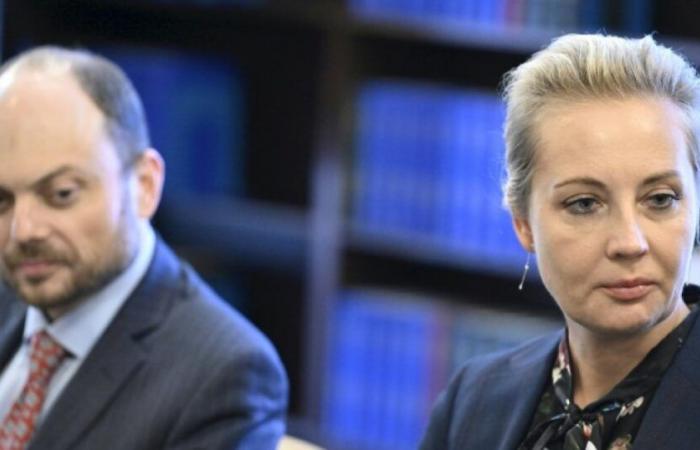The Russian opposition, exiled because of repression and weakened by internal conflicts, is organizing its first major demonstration abroad on Sunday in Berlin against the invasion of Ukraine and Vladimir Putin, which will serve as a test for its credibility policy.
Russian power has methodically eradicated all dissent in recent years, throwing hundreds, even thousands, of people behind bars and making any protest action impossible.
The opposition, which lost its figurehead, Alexeï Navalny, in February, who died in murky circumstances in prison, is deprived of the means to act in Russia and therefore forced to relaunch the movement from abroad.
The march in Berlin, a city which hosts crowds of exiles and Russian opponents, will take place from 1:00 p.m. GMT in the center of the German capital and plans to end in front of the Russian embassy.
It is organized by three major figures of the opposition: Yulia Navalnaïa, the widow of Alexeï Navalny who took over the reins of his movement, Ilia Iachine, former Moscow municipal deputy recently released from prison and Vladimir Kara-Mourza, longtime Kremlin critic who survived prison and two poisoning attempts.
“The march aims to bring together all those who oppose Vladimir Putin's aggressive war in Ukraine and political repression in Russia,” organizers said in a statement.
More concretely, this protest will demand the “immediate withdrawal” of Russian troops from Ukraine, the dismissal of Vladimir Putin and his trial as a “war criminal” and the release of all political prisoners held in Russia.
– Weakened movement –
This march will therefore be a test for the Russian opposition, as the movement has been weakened by years of repression, the death of Alexei Navalny and several recent serious internal struggles.
The last large gatherings of opposition supporters in Russia spontaneously brought together several thousand people, despite the risks, during Navalny's funeral in March 2024 and at the very beginning of the invasion of Ukraine in February 2022.
Tens of thousands of Russians also protested in January 2021 in many cities across the country, a movement repressed by the police with thousands of arrests.
However, since the death of Alexeï Navalny, the opposition has struggled to rekindle the flame of the fight against Russian power.
Illustrating these difficulties, Yulia Navalnaïa admitted during an interview with opposition television Dojd on Wednesday that she did not have a “plan” to achieve the fall of Vladimir Putin and an end to the war.
Several scandals within the Russian opposition have also weakened the movement and caused frustration among some of its activists.
In question, the attack with a hammer on an ally of Navalny, the victim pointing the finger at the movement of ex-oligarch Mikhail Khodorkovsky. Or these accusations against the anti-corruption foundation of the late opponent which allegedly covered up the machinations of crooked bankers in Russia.
– “Consolidate” the opposition –
Yulia Navalnaïa, Ilia Iachine and Vladimir Kara-Mourza, demonstrating together in Berlin, therefore hope to display unity, and mobilize the pool of tens of thousands of Russians who have left their country since 2022, in particular to escape military mobilization.
“It is very important to show that we can work together and consolidate the various forces of the Russian anti-war movement,” insisted Vladimir Kara-Mourza, on Dojd in early November.
Although the march aims to protest against the war, the event was harshly criticized by the Ukrainian ambassador to Germany, Oleksiï Makeïev, who mocked in the columns of Zeit a “walk without dignity and without consequences”.
Believing that the three opponents are not doing enough to support Ukraine and to call on their fellow citizens to protest, he castigated a demonstration which is only an illustration of the “weakness” of the movement.
Along the same lines, the association of Ukrainian exiles in Germany Vitsche judged that the event “fails to deliver a clear message” on support for Ukraine.
The Ukraine issue is a source of embarrassment for the Russian opposition, which is reluctant to show too much support for kyiv for fear of alienating Russians and destroying any hope of a future political career in a post-Russian Russia. Poutine.
The Kremlin has already dismissed the Berlin march as insignificant. Its spokesperson, Dmitri Peskov, on Wednesday mocked opponents who were “monstrously detached from their country” and whose “opinion has no importance”.






